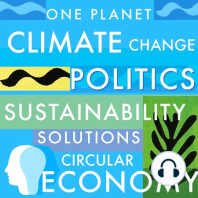20 min listen

(Highlights) ROB BILOTT
ratings:
Length:
20 minutes
Released:
Mar 30, 2022
Format:
Podcast episode
Description
“It's kind of a scary thought. We've got these PFAS (per- and polyfluoroalkyl substances), you hear them now referred to as forever chemicals because these chemicals–none of these existed on the planet prior to World War II–they're fairly recent invention and they have this unique chemical structure that makes them incredibly useful in a lot of different products, manufacturing operations, but also that same chemical structure makes them incredibly persistent and incredibly difficult to break down once they get out into the environment, into the natural world, into our soil, into our water. They simply, many of them, particularly the ones with eight or more carbons in their structure, don't break down under natural conditions. Or it may take thousands or millions of years for those chemicals to start breaking down. But not only that. Once they get into us, they get into people, they tend to accumulate in our blood and build up over time. They not only persist, they bioaccumulate. Unfortunately, as the science has slowly been revealed to the world about what these chemicals can do, we are seeing that they can have all kinds of toxic effects And unfortunately, we’re finding that those things can happen at lower and lower dose levels.”“I can't speak highly enough of Mark Ruffalo and what he was able to accomplish with the film. He just did an amazing job. He reached out to me after reading the story that appeared in The New York Times Magazine back in 2016 about this situation down in West Virginia along the Ohio River and was really shocked when he read about it because it was really highlighting an environmental contamination problem that had potentially nationwide, if not worldwide implications but that he had never heard of, and you know he was active in the environmental arena and active in water issues and was surprised that he had not heard of this before and really wanted to find a way to help bring the story out to a wider audience so that we could hopefully start seeing some change in the way type of situations not only develop but how we deal with them. He was able to team up with the folks at Participant Media, who, if you go on their website, and see the types of films they've produced are just incredible filmmakers. Teamed up with Todd Haynes who is an incredible director, and just a terrific cast. Anne Hathaway, Tim Robbins and others. Really they were very dedicated to making sure they did the story and brought it to film in the right way, to show what really happened, not only legally and scientifically, but also to real people. What kind of impact these situations have on real people in real communities. What these people went through for 20 years in this community waiting for this process to unfold. So I think they did a tremendous job in taking a very complicated story that involves a lot of science and a lot of law and conveying it in a way that really impresses upon people why this is a story that matters to all of us and why this is a story that really is one that hopefully is inspiring because, as we discussed, it shows that things can be changed. Things that look impossible can be overcome.”Rob Bilott is a partner in the Cincinnati and Northern Kentucky offices of the law firm, Taft Stettinius & Hollister LLP, where he has practiced in the Environmental and Litigation Practice Groups for over 31 years. During that time, Rob has handled and led some of the most novel and complex cases in the country involving damage from exposure to per- and polyfluoroalkyl substances (“PFAS”), including the first individual, class action, mass tort, and multi-district litigation proceedings involving PFAS, recovering over $1 billion for clients impacted by the chemicals. In 2017, Rob received the Right Livelihood Award, known as the “Alternative Nobel Prize,” for his decades of work on behalf of those injured by PFAS chemical contamination. Rob is the author of the book, “Exposure: Poisoned Water, Corporate Greed, and O
Released:
Mar 30, 2022
Format:
Podcast episode
Titles in the series (100)
DAVID SIMON: Interviewed by Mia Funk & Eric Rosin · Associate Podcast Producer Jacob A. Preisler & Eric Rosin by Sustainability, Climate Change, Renewable Energy, Politics, Activism, Biodiversity, Carbon Footprint, Wildlife, Regenerative Agriculture, Circular Economy, Extinction, Net-Zero · One Planet Podcast